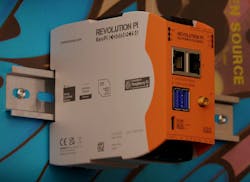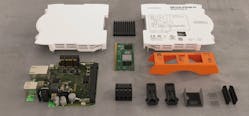The concept of using open-source software has become increasingly commonplace in industry, with many large software vendors incorporating use of open-source technologies as part of their software portfolio. Open-source industrial hardware devices are not quite as common.
One example of an open-source industrial automation device that’s been gaining ground over the years comes from Kunbus, a Germany-based supplier of industrial communication technologies. Kunbus has been advancing its Revolution Pi industrial PC (IPC), based on the Raspberry Pi Compute Module, since 2016. The Revolution Pi IPC is composed of open hardware and software that meet the EN61131-2 standard.
According to Kunbus, Revolution Pi (RevPi), because of its modular structure, can be supplemented by digital or analog I/O modules and its DIN rail-mountable housing allows for flexibility in installation. RevPi base modules operate at typical industrial voltages ranging from 10.7 to 28.8V dc, making them suitable for use in machines and manufacturing facilities.
RevPi base modules feature USB, Ethernet and HDMI connections. The two USB 2.0 sockets are each capable of supplying 500mA at 5V, alleviating the need for an external USB power supply when connecting parallel devices. The onboard RJ45 Ethernet connection is industrially hardened with suppressor circuits, and a micro-HDMI socket is included for connecting a monitor with sound output.
Deterministic capabilities
According to Kunbus, RevPi uses a split OS, providing the determinism of an RTOS, along with the versatility of a standard OS. As a result, RevPi can be developed into an industrially viable small control system, a large scale IIoT (industrial Internet of Things) platform or elements of both simultaneously. Its scheduler—which controls the execution of tasks by the operating system—can be configured to avoid networking or software resource delays, ensuring the best performance for real-time control and other critical or time-sensitive tasks.
RevPi also features support for third-party software, such as Codesys’s Soft PLC. The latest version—RevPi Connect 4—was released in August 2023, adding a Broadcom BCM2711 processor and support for WLAN and Bluetooth communications. This most recent lineup addition also comes with a battery-buffered real-time clock and easier I/O expansion with a plug-and-play GUI.


